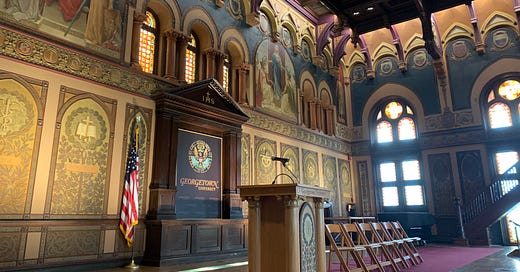Investing in the future: The complex value of a college degree
The value of higher education, particularly a 4-year college degree, has been under debate for decades. Growing tuition costs, shifting job prospects and the increasing popularity of alternative accreditation pathways have made many more skeptical of the value of a degree.
Amidst growing scrutiny and doubts, current and future students should explore a number of essential questions: What is the true value of college? Who, if not all people, should enroll in a 4-year degree program? Is financial return the most appropriate metric to evaluate this pivotal life decision?
For most students and their families, college is an investment that brings a brighter future. There are two big factors in this decision: the initial investment (i.e., the total cost of college education) and the incremental returns (i.e., all earnings after college).
Rising Cost of Tuition
A decline in investment cost usually indicates a good investment decision. However, colleges—both private and public—have become much more expensive.
Adjusted for inflation, tuition and fees have increased by about 41% at private national universities and 32% at out-of-state or public national universities in the last two decades, dramatically outpacing growth in real wages.
Despite growing financial burdens, many students at Georgetown still unwaveringly believe in the importance of receiving a 4-year education.
“College is very expensive,” said Judy Liu (SFS ’26). “But this has never impacted my decision-making for college though. I think college is an investment. I’d gain all the education I can now in order to give back even more to my parents in the future through climbing up the social ladder.”
Indeed, the “promising return” of college has kept many working hard to complete this path. Significant data, including a 2022 study, show substantially higher earnings for workers with a bachelor’s degree than those with only a high school diploma.
“If you don’t go to college, or at least attempt to get higher education, you are stuck in a cycle of stagnation,” contends Amy White, a junior majoring in Global Health in the School of Health. “If you cannot afford college right now, it is a stronger reason for you to save up money to get that degree to get better pay in the future.”
The idea that college is the “golden ticket to the middle class” is not unfamiliar to many. Yet, data like the one comparing earnings by different education levels could mislead the public into perceiving college as a risk-free investment. The central measurement of the average earnings means that not everyone who goes to college is guaranteed to receive the desirable financial outcome.
Moreover, the high college non-completion rate—40% among those accepted to college and 40.4 million student loan borrowers—means that many people never realize the earning premium that a college education can bring.
Researchers from the BurningGlass Institute have also found that employers’ demand for bachelor’s and post-graduate degrees is starting to decrease notably after a sustained period of degree inflation, during which educational qualifications required for jobs increase, often beyond what is actually necessary to perform the work effectively. The impacts are mostly concentrated in middle-skill jobs, which might explain why the pursuit of elite college degrees and high-income professions remains heated.
This changing education landscape has led to a shift, if not a reversal, in public perception of education. As the return on investment of a college degree becomes less certain today, alternative pathways have gained some popularity. Indeed, vocational and technical schools tend to be more affordable and provide a faster pathway into the workforce with less student debt, in some instances as much as 70% compared to traditional colleges.
Different ROIs by Fields of Study
For some students committed to pursuing a license in advanced professions like medicine and law, going to college is a no-brainer.
"For our major, a lot of people have to do a four-year degree because we're pre-med. We want to pursue a medical degree in the future, and the bachelor's degree is very necessary for that to happen,” said Jim Wang, a junior in the School of Health majoring in Human Science.
Meanwhile, empirical evidence does show correlations between specific majors and differing levels of financial return. Engineering and computer science majors have the highest median returns, exceeding 13%. Business, health and math/science majors follow with returns between 10% and 13%. Biology, agriculture and social science majors see returns of about 8% to 9%, while education and humanities/arts majors have the lowest returns, under 8%.
Whether students majoring in STEM should receive a liberal arts education, in contrast, is up for much more debate. Proponents of a liberal arts education argue that emphasis on building critical human skills and the development of creative and interdisciplinary thinking allows students to tackle significant challenges.
Most Georgetown students and faculty appreciate a holistic education that teaches both technical skills and non-cognitive capabilities.
“The importance of college is teaching me how to think, how to learn new things, and how to problem solve,” said Liu.
“While AI has recently become a massive phenomenon,” White shared, “one should not underestimate the importance of human-to-human interaction, so there will always be value in liberal arts education that cultivates creativity and individuality and deals with human emotions. Those are difficult to program and replicate.”
Indeed, there has been a growing recognition of a liberal arts education as an essential pillar of higher education experience. Purdue University recently established a general education program that mandates liberal arts courses. Melinda Zook, a History Professor running the program shared her belief in the value of this education with PBS News.
“I often look at my students and I think, your life is going to be filled with crucial choices. Will you make the right ones? And if you don't know anything, right, if you don't know anything about the world or yourself or others, how can you?”
Signaling Effect
Despite a clear correlation between education and income levels, there is no consensus on exactly what causes it. One group of scholars believes college degrees serve as a “signal or proxy for a package of personal attributes that contribute to long-term work and career success.”
Jeremy Arkes, a retired economics professor from the Graduate School of Business and Public Policy, Naval Postgraduate School, found in his research that employers value the attainment of a bachelor's degree in part because it signals valuable pre-college abilities as opposed to the experiences and learning happening during college.
The link between college degrees and desirable personal attributes has become something many consider intuitive, almost taken for granted.
“It raises your price,” White said, “When you graduate from an institution like Georgetown, people will associate you with being a hard worker and high achiever, even if you have a lower GPA.”
Some studies have found that college students often differ from non-college students in ways that influence their earning potential. As a result, college graduates might still earn more than non-graduates, even if they hadn't attended college, due to those pre-existing differences. However, by qualifying and completing college, they demonstrate to employers these qualities that prepare them well for a professional career.
While financial calculations and signaling effects undoubtedly play a role in shaping the public’s and employers’ perception of the value of obtaining a college degree, students and faculty point out the indispensable non-financial benefits of college.
The Importance of Human Capital
Professor John Mayo, the Elsa Carlson McDonough Chair of Business Administration and Professor of Economics, Business and Public Policy for 25 years at Georgetown, believes that there are substantial non-financial values to a college experience, primarily from the accumulation of human capital.
“There would be a massive hole in my intellectual life had I not engaged in four years of undergraduate schooling and another four in graduate school,” he said.
While studies show little retention of the factual specifics of the courses even in elite colleges, students and professors agree that college plays the essential function of teaching students how to think.
“The specifics of an accounting exercise, of an economic situation or of a marketing case will never be repeated when you graduate, so knowing these specifics is not the key to education. What matters is that the process of learning these specifics sharpens our mental agility, allowing us to address new challenges, drawing on that deep knowledge,” said Professor Mayo.
Keira Ferrell (SFS ’26) agrees, sharing that in most cases, “whatever the career, college is important for developing better critical thinking skills, and overall building the ability to see different perspectives and the complexities of the world.”
The growing emphasis on career-focused development at Georgetown University, particularly within the McDonough School of Business, raises concerns for Mayo, who believes prioritizing professional preparation over academic exploration and personal growth undermines the full value of a four-year college education.
“While I think we add a lot of intellectual value in our business curriculum, there are some vocational aspects of the undergraduate and graduate business school that I’m not proud of,” he said, pointing to the normalized phenomenon of students leaving class early or ditching class altogether to attend company information sessions. “Undergraduate and graduate school education is a unique and special time to build your human capital; one you will rely upon for the rest of your lives.”
Lifelong Benefits
Brent Orrell, a senior fellow at the American Enterprise Institute, points out in a comprehensive report published in January that there are additional non-financial outcomes for those who attended college: longer life expectancy, a higher likelihood to volunteer, vote and participate in their communities, higher marriage rates and lower divorce rates and larger social networks.
“It teaches me to self-reflect. By choosing courses every semester and deciding which major to major in, I constantly ask myself: ‘What do I want? What do I want to become in the future?’ said Liu.
“One of the most important things I get out of a 4-year rather than community college…is a sense of community for four years. Being on one campus for four years, you can gain relationships with others, both friendships and relationships with professors or others in a field that you want to pursue,” said Ferrell.
College might not be for everyone.
The “college-for-all” consensus from a few decades prior is no longer shared by most. Yet, justifications for alternative pathways have been primarily centered on the decreasing financial return of a college degree and the growing availability of employer-approved technical accreditations pathways.
In reality, that decision should rely on several other factors.
Some scholars and faculty contend that while financial situations matter, individuals should more rigorously examine whether college experience suits their interests, needs and personality. Orrell observes that “many young people are sent to college who are either not interested in or not ready for the rigors of being a full-time, postsecondary student.”
Mayo emphasizes intellectual curiosity as one of the most significant non-financial factors influencing individuals' educational choices.
“There is an array of heterogeneous intellects that come out of high school,” he said. “Some have less curiosity of the world and seek stable, straightforward careers. For them, community college or vocational programs are the perfect landing pads."
For those who have the curiosity and desire to learn but not the financial capability? Mayo believes that public policy should step up to offer that support.
What does this mean for Georgetown Students?
At an elite higher education institution like Georgetown, perspectives and beliefs reasonably differ from those of the average U.S. population. Students and faculty are more likely to see college as a good if not necessary investment.
“Everyone around me, from elementary to high school, preached the idea of going to college as the end goal,” White shared about her experience growing up in Brooklyn, NY. “The feeder schools were filled with the narrative that they would make sure the students were ‘college-ready,’ and so that was always the next step for me.”
Liu and Wang agree with this feeling of a “set path” where going to college was never a question.
"It’s just like kids have to go to kindergarten when they reach 3 years old,” Liu said.
At an elitist institution like Georgetown, the conventional idea of success and the pathways to get there appear especially embedded. However, it has become increasingly clear that there is no single route to success.
After all, even the connotation of “success” has been changing.
No matter our individual motivations for pursuing a four-year degree, it is helpful to reflect on the financial and non-financial implications of our educational choices. Doing so can enhance our remaining time at Georgetown and inform our future.






